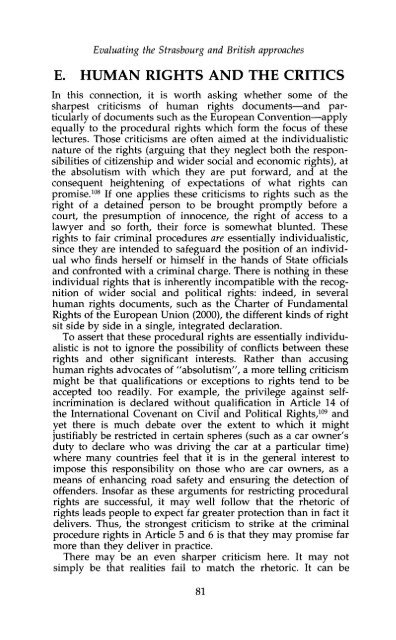Human Rights, Serious Crime and Criminal Procedure - College of ...
Human Rights, Serious Crime and Criminal Procedure - College of ...
Human Rights, Serious Crime and Criminal Procedure - College of ...
- No tags were found...
You also want an ePaper? Increase the reach of your titles
YUMPU automatically turns print PDFs into web optimized ePapers that Google loves.
Evaluating the Strasbourg <strong>and</strong> British approachesE. HUMAN RIGHTS AND THE CRITICSIn this connection, it is worth asking whether some <strong>of</strong> thesharpest criticisms <strong>of</strong> human rights documents—<strong>and</strong> particularly<strong>of</strong> documents such as the European Convention—applyequally to the procedural rights which form the focus <strong>of</strong> theselectures. Those criticisms are <strong>of</strong>ten aimed at the individualisticnature <strong>of</strong> the rights (arguing that they neglect both the responsibilities<strong>of</strong> citizenship <strong>and</strong> wider social <strong>and</strong> economic rights), atthe absolutism with which they are put forward, <strong>and</strong> at theconsequent heightening <strong>of</strong> expectations <strong>of</strong> what rights canpromise. 108 If one applies these criticisms to rights such as theright <strong>of</strong> a detained person to be brought promptly before acourt, the presumption <strong>of</strong> innocence, the right <strong>of</strong> access to alawyer <strong>and</strong> so forth, their force is somewhat blunted. Theserights to fair criminal procedures are essentially individualistic,since they are intended to safeguard the position <strong>of</strong> an individualwho finds herself or himself in the h<strong>and</strong>s <strong>of</strong> State <strong>of</strong>ficials<strong>and</strong> confronted with a criminal charge. There is nothing in theseindividual rights that is inherently incompatible with the recognition<strong>of</strong> wider social <strong>and</strong> political rights: indeed, in severalhuman rights documents, such as the Charter <strong>of</strong> Fundamental<strong>Rights</strong> <strong>of</strong> the European Union (2000), the different kinds <strong>of</strong> rightsit side by side in a single, integrated declaration.To assert that these procedural rights are essentially individualisticis not to ignore the possibility <strong>of</strong> conflicts between theserights <strong>and</strong> other significant interests. Rather than accusinghuman rights advocates <strong>of</strong> "absolutism", a more telling criticismmight be that qualifications or exceptions to rights tend to beaccepted too readily. For example, the privilege against selfincriminationis declared without qualification in Article 14 <strong>of</strong>the International Covenant on Civil <strong>and</strong> Political <strong>Rights</strong>, 109 <strong>and</strong>yet there is much debate over the extent to which it mightjustifiably be restricted in certain spheres (such as a car owner'sduty to declare who was driving the car at a particular time)where many countries feel that it is in the general interest toimpose this responsibility on those who are car owners, as ameans <strong>of</strong> enhancing road safety <strong>and</strong> ensuring the detection <strong>of</strong><strong>of</strong>fenders. Ins<strong>of</strong>ar as these arguments for restricting proceduralrights are successful, it may well follow that the rhetoric <strong>of</strong>rights leads people to expect far greater protection than in fact itdelivers. Thus, the strongest criticism to strike at the criminalprocedure rights in Article 5 <strong>and</strong> 6 is that they may promise farmore than they deliver in practice.There may be an even sharper criticism here. It may notsimply be that realities fail to match the rhetoric. It can be81
















